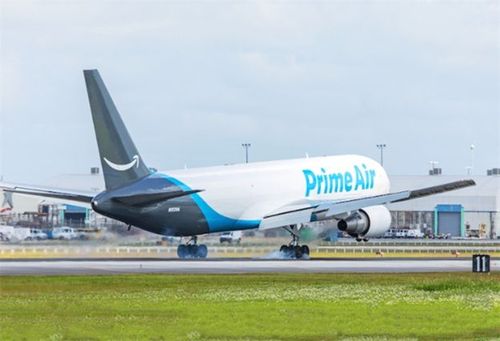Neste extends SAF supply to Ontario International Airport through deal with Amazon Air

PHOTO: Amazon
June 18, 2025
BY Neste Corp.
Neste has reached an agreement with Amazon to provide 7,500 metric tons (2.5 million gallons) of neat Neste MY Sustainable Aviation Fuel for its Amazon Air cargo operations at San Francisco International Airport and Ontario International Airport in California, through to the end of 2025. This agreement makes Amazon the first company to purchase and use sustainable aviation fuel (SAF) at Ontario International Airport, ranked among the top 10 cargo airports in the U.S.*
Amazon has made an ambitious commitment to reach net-zero carbon emissions across its global operations by 2040, and adopting SAF is a key lever to decarbonize its air cargo operations. The agreement to use SAF in California is part of a broader cooperation between Amazon and Neste that started four years ago when Neste delivered SAF to Amazon at Cologne Bonn Airport in 2021.
Neste’s SAF is blended with conventional jet fuel and supplied to the Amazon Air network at both airports. The first volumes were successfully delivered earlier this year. Leveraging Neste's SAF supply capabilities established in Northern California in 2020, the fuel is delivered directly to San Francisco International Airport via existing pipeline infrastructure. For Amazon Air’s operation at Ontario International Airport, the SAF is delivered to the airport by trucks from Neste’s SAF terminal facilities in Los Angeles by Diesel Direct, Neste’s long-term partner. Diesel Direct uses Neste’s renewable diesel to fuel trucks dedicated to the SAF deliveries to reduce greenhouse gas (GHG) emissions from SAF transportation.
“We are excited to provide SAF to Amazon Air at two major airports in California. This milestone sends a positive signal that SAF is available to airlines and cargo operators, like Amazon Air at these airports. Our supply chain solution for these California gateways builds on our existing SAF supply capabilities on the West Coast in the U.S., and leverages our partnership with Diesel Direct to transport SAF by trucks running on renewable diesel. This demonstrates how renewable fuels can help our customers easily reduce greenhouse gas emissions across different transportation modes,” said Carl Nyberg, Senior Vice President, Commercial, Renewable Products at Neste.
Advertisement
Advertisement
Related Stories
Marathon Petroleum Corp. on Aug. 5 released second quarter financial results, reporting improved EBITDA for its renewable diesel segment. The company primarily attributed the improvement to increased utilization and higher margins.
Chevron Corp. on Aug. 1 confirmed the company started production at the Geismar renewable diesel plant in Louisiana during the second quarter after completing work to expand plant capacity from 7,000 to 22,000 barrels per day.
California’s new specified source feedstock attestation requirement: A critical new compliance step for renewable fuel producers
As of July 2025, California’s SCFS requires renewable fuel producers using specified source feedstocks to secure attestation letters reaching back to the point of origin. This marks a significant shift in compliance expectations.
The public comment period on the U.S. EPA’s proposed rule to set 2026 and 2027 RFS RVOs and revise RFS regulations closed Aug. 8. Biofuel groups have largely expressed support for the proposal but also outlined several ways to improve the rulemaking.
In celebration of World Biodiesel Day, MOL Group on Aug. 8 announced SAF was successfully produced for the first time at INA’s Rijeka Refinery during a pilot project to process biocomponent. Renewable diesel was also produced.
Upcoming Events










